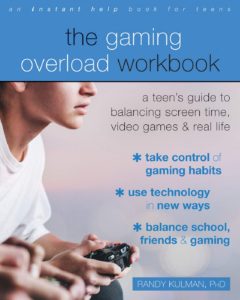I am very pleased to announce the recent publication of my newest book The Gaming Overload Workbook: A teenager’s guide to balancing screen time, video games & real life. Published by New Harbinger Publications, the book is a tool for starting conversations between teenagers and adults about screen time. It helps teens to see and validate the benefits of screen time while also recognizing how distractions from their screens interfere with other parts of their lives. The book is designed as a workbook for teenagers to help them examine the amount of time they’re spending playing video games, using social media, and engaging in other screen-based activities. It is written so that teens who read it can feel positive about the benefits of their screen time, while also considering real questions about its impact on them. I also wrote it so that teenagers who enjoy screen time as an opportunity to communicate with their peers, relax from the stress of their days, or challenge themselves to get better at a video game do not feel criticized for their interests.
It is common to hear experts in education and mental health express concerns about what teenagers are doing with screens. These concerns have been strongly emphasized over the past decade, and have only intensified with the COVID-19 pandemic. What is less known is that many teenagers have already recognized that they spend more time with screens than they want and that screen time can have an addictive quality. Teens know better than adults that these technologies are designed to keep them glued to their screens and they don’t like being tricked. A study conducted by the Pew Research Center suggests that more than 50% of teenagers acknowledge too much time on screens. If a teen is allowed to identify their own concerns about screen time, they are less likely to become defensive when a parent comments on the amount of time they spend on their screens. This opens the door to a more positive discussion. When adults take the perspective that screen time itself is not the problem but that excessive screen time, that excludes other healthy activities, is the concern, teens often nod their heads in agreement.

The Gaming Overload Workbook provides 30 activities to generate these types of discussions. Teens are encouraged to look at their own screen time as well as that of their families and friends. They are directed to consider why they play video games, how video games and screens can impact their life in a positive way, how screen-based activities can improve learning and assist with the development of executive functioning skills, as well as how screen time helps with peer connections. However, they are also encouraged to recognize how screen time can interfere with sleep, take away from exercise, and sometimes cause more stress in their lives.
I encourage families with teenagers as well as clinicians and health care professionals who work with teens to get a copy of The Gaming Overload Workbook. Read the letters to parents and kids at the beginning and then select a few of the many activities to try out at home. I’d love your comments and feedback and, if you like the book, a good review on any of the major bookseller websites.
Receive online class information and helpful tips from Dr. Randy Kulman's LearningWorks for Kids |




